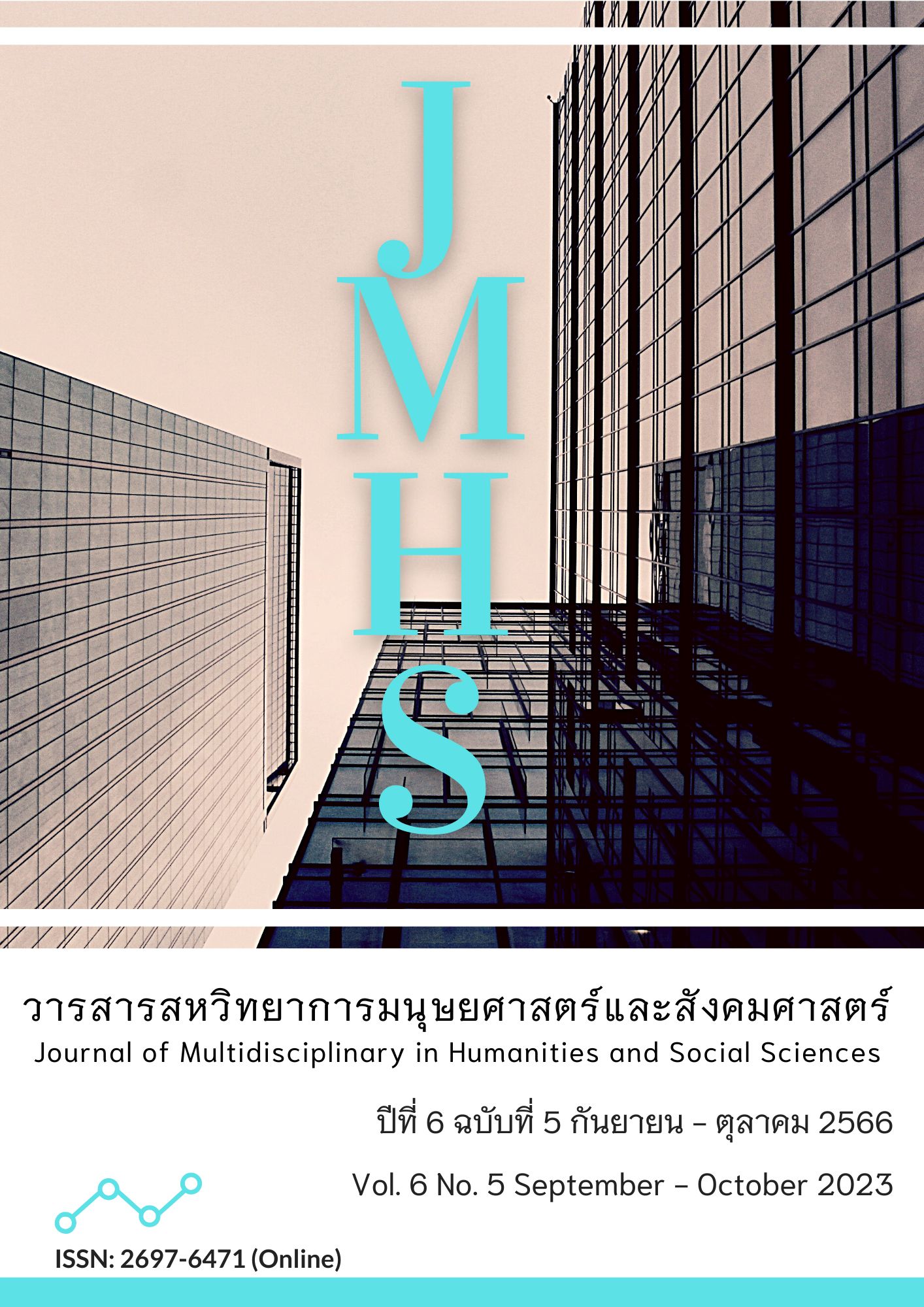Causal Factors Influencing Loyalty to Buy Plant via Facebook Page in Bangkok and Its Vicinity
Main Article Content
Abstract
This article aimed to: 1) develop and validate a causal relationship model of loyalty to buy plants via Facebook page in Bangkok and its vicinity; and 2) study causal factors influencing loyalty to buy plants via Facebook page in Bangkok and its vicinity. This study was quantitative research. The sample consisted of people who have bought plants via their Facebook page and live in Bangkok and its vicinity—a total of 340 people by convenience sampling. The tools used in the research were online questionnaires. The statistics used in data analysis were frequency, percentage, confirmatory factor analysis, and structural equation model.
The results of this research were the development of the causal relationship models, which consisted of four components: 1) service quality; 2) satisfaction; 3) perceived value; and 4) loyalty. The model was consistent with the empirical data to a great extent. The statistics showed CMIN/df = 1.68, CMIN = 259.77, df = 155, GFI = 0.93, AGFI = 0.90, SRMR = 0.04, and RMSEA = 0.05. The final predictive coefficient was 0.96, indicating that the variables in the model can explain the variance of loyalty to buy plants via the Facebook page by 96 percent. It was found that satisfaction and perceived value had influences on loyalty, respectively. The results of this research indicated that entrepreneurs who sell plants on their Facebook page should consider factors such as convenient ordering, fast delivery, and good after-sales service to cultivate customer loyalty to buy plants in the future.
Article Details

This work is licensed under a Creative Commons Attribution-NonCommercial-NoDerivatives 4.0 International License.
Views and opinions appearing in the Journal it is the responsibility of the author of the article, and does not constitute the view and responsibility of the editorial team.
References
จักรพันธ์ กิตตินรรัตน์ และ จุฑาทิพย์ พหลภาคย์. (2562). คุณภาพบริการกับการสร้างความภักดีของลูกค้า: องค์ประกอบในบริบทของธุรกิจการให้บริการโทรศัพท์เคลื่อนที่ในประเทศไทย. วารสารเศรษฐศาสตร์และกลยุทธ์การจัดการ, 6(1), 135-151. สืบค้นจาก https://kukrdb.lib.ku.ac.th/journal/JEMS/search_detail/result/20006677
ณัฐพล ม่วงทำ. (2565). 3 Insight Ecommerce 2022 ข้อมูลพฤติกรรมการซื้อขายของออนไลน์จาก Digital Stat 2022. สืบค้นเมื่อ 19 มีนาคม 2566, จาก https://www.everydaymarketing.co/trend-insight/insight-ecommerce-thai-2022-digital-stat-we-are-social/
ทิบดี ทัฬหกรณ์ และ ประสพชัย พสุนนท์. (2565). ปัจจัยที่มีอิทธิพลต่อการตัดสินใจเลือกใช้บริการร้านกาแฟทรู (True Coffee) ในเขตกรุงเทพมหานคร. วารสารดุษฎีบัณฑิตทางสังคมศาสตร์, 6(3), 169-180.
ธนาคารกรุงเทพ. (2564). ‘ปลูกต้นไม้’ ธรรมชาติบำบัด สลัดความเครียดจากโควิด. สืบค้นเมื่อ 6 พฤศจิกายน 2565, จาก https://www.bangkokbanksme.com/en/nature-the-stress-of-covid
นภัทสร บุหรี่ทอง และ ชิณโสณ์ วิสิฐนิธิกิจา. (2561). คุณภาพการบริการที่เป็นเลิศส่งผลต่อคุณค่าการให้บริการแก่ลูกค้าของพนักงาน บริษัท ท่าอากาศยานไทย จำกัด (มหาชน) สาขาสุวรรณภูมิอาคารผู้โดยสารขาออก. Veridian E-Journal, Silpakorn University ฉบับภาษาไทย มนุษยศาสตร์ สังคมศาสตร์ และศิลปะ, 11(1), 476-489. สืบค้นจาก https://he02.tci-thaijo.org/index.php/Veridian-E-Journal/article/view/118566
พนัชกร สิมะขอรบุญ และ ตติยา คู่มงคลชัย. (2561). ปัจจัยเหตุของความพึงพอใจที่มีต่อความภักดีของลูกค้า: กรณีเว็บไซต์บิวตี้คูล. Veridian E-Journal, Silpakorn University ฉบับภาษาไทย มนุษยศาสตร์ สังคมศาสตร์ และศิลปะ, 11(3), 3121-3139. สืบค้นจาก https://he02.tci-thaijo.org/index.php/Veridian-E-Journal/article/view/166069
พัฒนา พรหมณี, ยุพิน พิทยาวัฒนชัย และ จีระศักดิ์ ทัพผา. (2563). แนวคิดเกี่ยวกับความพึงพอใจและการสร้างแบบสอบถามความพึงพอใจในงาน. วารสารวิชาการสมาคมสถาบันอุดมศึกษาเอกชนแห่งประเทศไทย, 26(1), 59-66. สืบค้นจาก https://so06.tci-thaijo.org/index.php/apheit-ss/article/view/241557
พีรวิชญ์ ธีระกาญจน์ และ สุรสิทธิ์ อุดมธนวงศ์. (2562). อิทธิพลของการรับรู้คุณค่าและการตระหนักรู้ตราสินค้าที่ส่งผลต่อการซื้อซ้ำของผลิตภัณฑ์ซีเรียลผ่านช่องทางออนไลน์ของผู้บริโภค ในเขตกรุงเทพมหานคร. วารสารบริหารธุรกิจ มหาวิทยาลัยแม่โจ้, 1(2), 60-71. สืบค้นจาก https://so05.tci-thaijo.org/index.php/MJBA/article/view/255219
ลลิตา พ่วงมหา. (2563). ปัจจัยเชิงสาเหตุที่มีอิทธิพลต่อความภักดีในตราสินค้าร้านหนังสือ. วารสารมนุษยศาสตร์และสังคมศาสตร์, 26(3), 77-87. สืบค้นจาก https://so05.tci-thaijo.org/index.php/tgt/article/view/246567
ไลน์ มายช้อป. (2564). เปิด "ตลาดต้นไม้ออนไลน์" สินค้าขายดีทั้งออนไลน์และออฟไลน์. สืบค้นเมื่อ 19 พฤศจิกายน 2565, จาก https://lineshoppingseller.com/market-trend/plant-market
วิรัตน์ ชนะสิมมา และ ทตมัล แสงสว่าง. (2564). คุณภาพการให้บริการที่ส่งผลต่อความพึงพอใจของประชาชนที่ชำระภาษีท้องถิ่นกับเทศบาลตำบลหนองนาคำ กรณีศึกษาตำบลบ้านโคก อำเภอหนองนาคำ จังหวัดขอนแก่น. วารสารวิชาการและวิจัย มหาวิทยาลัยภาคตะวันออกเฉียงเหนือ, 11(2), 15-28. สืบค้นจาก https://so04.tci-thaijo.org/index.php/neuarj/article/view/246779
ศิวานนท์ จันทรประวัติ และ กุลกัญญา ณ ป้อมเพ็ชร. (2562). ความพึงพอใจในคุณภาพการบริการขนส่งพัสดุของไปรษณีย์ไทยที่ส่งผลต่อความภักดีด้านพฤติกรรมของผู้ประกอบธุรกิจสินค้าออนไลน์ในเขตภาคกลาง. วารสารการบริหารและการจัดการ, 9(1), 59-79. สืบค้นจาก https://so02.tci-thaijo.org/index.php/fam/article/view/214993
สำนักงานพัฒนาธุรกรรมทางอิเล็กทรอนิกส์. (2565). ผลการสำรวจพฤติกรรมผู้ใช้อินเทอร์เน็ตในประเทศไทย ปี2565. สืบค้นเมื่อ 6 พฤศจิกายน 2565, จาก https://www.etda.or.th/th/pr-news/iub2022.aspx
สุภัตรา แปงการิยา และ สุมาลี สว่าง. (2561). ปัจจัยการรับรู้คุณค่าที่ลูกค้าได้รับและปัจจัยคุณภาพความสัมพันธ์ที่ส่งผลต่อความภักดีของลูกค้าร้านขายยาในประเทศไทย. วารสารเศรษฐศาสตร์และบริหารธุรกิจปริทัศน์, 14(1), 14-36. สืบค้นจาก https://www.rsu.ac.th/bae/index.php?/article/detail/113
สุมามาลย์ ปานคํา และ ภัคจิรา ชื่นโพธิ์กลาง. (2565). ปัจจัยเชิงสาเหตุที่มีอิทธิพลต่อความตั้งใจซื้อสินค้าร้านคาเฟ่อเมซอนบนแอปพลิเคชันไลน์แมนของผู้บริโภคในกรุงเทพมหานครและปริมณฑล. วารสารสหวิทยาการมนุษยศาสตร์และสังคมศาสตร์, 5(3), 1121-1136. สืบค้นจาก https://so04.tci-thaijo.org/index.php/jmhs1_s/article/view/257655
อัมพล ชูสนุก, มิลินลดา กุลนายุ, ฉวีวรรณ ชูสนุก และสุภาพร เพ่งพิศ. (2559). อิทธิพลของคุณภาพการให้บริการต่อคุณค่าที่รับรู้ ความพึงพอใจ และความจงรักภักดีของผู้ใช้บริการคลินิกเสริมความงามในเขตกรุงเทพมหานคร. Veridian E-Journal, Silpakorn University ฉบับภาษาไทย มนุษยศาสตร์ สังคมศาสตร์ และศิลปะ, 9(1), 1565-1584. สืบค้นจาก https://he02.tci-thaijo.org/index.php/Veridian-E-Journal/article/view/61597
Hair, J. F., Black, W. C., Babin, B. J., & Anderson, R. E. (2010). Multivariate Data Analysis. (7th ed.). New Jersey: Prentice Hall.
Hair, J. F., Hult, G. T. M., Ringle, C. M., & Sarstedt, M. (2014). A Primer on Partial Least Squares Structural Equation Modeling (PLS-SEM). California: Sage.
Hoelter, J. W. (1983). The Effects of Role Evaluation and Commitment on Identity Salience. Social Psychology Quarterly, 46(2), 140–147. https://doi.org/10.2307/3033850
Hu, L.T., & Bentler, P. M. (1999). Cutoff Criteria for Fit Indexes in Covariance Structure Analysis: Conventional Criteria Versus New Alternatives. Structural Equation Modeling, 6(1), 1–55. https://doi.org/10.1080/10705519909540118
Joreskog, K. G., & Sorbom, D. (1984). Advances in Factor Analysis and Structural Equation Models. Lanham: Rowman & Littlefield.
Kline, R. B. (2011). Principles and Practices of Structural Equation Modeling. (3rd ed.). New York: The Guilford.
Nejad, N., Vakilimofrad, H., Fazli, F., Saberi, M. K., Doulani, A., & Mazloum, J. (2021). Developing a Model to Identify the Factors Contributing to User Loyalty of University Libraries, The Journal of Academic Librarianship, 47(5), 1-11. https://doi.org/10.1016/j.acalib.2021.102386
Schreiber, J. B., Stage, F. K., King, J., Nora, A., & Barlow, E. A. (2006). Reporting Structural Equation Modeling and Confirmatory Factor Analysis Results: A Review. The Journal of Educational Research, 99(6), 323–337. https://doi.org/10.3200/JOER.99.6.323338
Schumacker, R. E., & Lomax, R. G. (2004). A Beginner's Guide to Structural Equation Modeling. (2nd ed.). New Jersey: Lawrence Erlbaum Associates.
Thompson, B. (2004). Exploratory and Confirmatory Factor Analysis: Understanding Concepts and Applications. Washington, D.C.: American Psychological Association.
Ullman, M. T. (2001). The Declarative/procedural Model of Lexicon and Grammar. Journal of Psycholinguistic Research, 30(1), 37–69. https://doi.org/10.1023/A:1005204207369.


